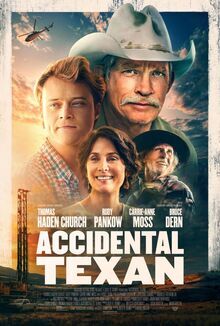Accidental Texan

A bad first impression won’t necessarily ruin a movie. If anything, it’s more important that a film stick the landing, so the audience doesn’t walk out grumbling, “it was okay, but that ending.”
Still, sometimes a movie stumbles so badly in its first five minutes that it never recovers. Such is the case with “Accidental Texan,” a film whose opening sequence so utterly fails to evoke the look and feel of a movie set that it calls into question how much director Mark Lambert Bristol knows about life in general. Because if a filmmaker can’t convincingly evoke filmmaking, what could they possibly have to say about anything else?
It’s certainly essential context for the down-home folksiness that drives the majority of the film, which unfolds after aspiring actor Erwin Vandeveer (Rudy Pankow) is fired from his lead role in the blockbuster movie mentioned above. Why? For a technical snafu where the ringtone (which is on) of his phone (which is in the front pocket of his costume) somehow sets off a chain of explosions that destroys the entire set he’s standing on.
Driving back to Los Angeles, Erwin’s Prius breaks down, forcing him to wander on foot into the type of wholesome one-horse hamlet that only exists in the movies. There, he encounters Faye (Carrie-Ann Moss), an utterly unconvincing small-town diner waitress. (No offense to Ms. Moss, who’s great, but she has never called anyone “hon” in her life.) She tells him that the people here in Buffalo Gap, Texas live a simpler—and therefore more morally pure, in this movie’s calculus—type of lifestyle, and he’ll have to wait until tomorrow to get his car towed. He ends up staying much longer than that.
Erwin’s Boston upbringing and book learnin’ (he’s a Harvard business school dropout) are foils for the film’s rough-palmed, no-nonsense rural conservatism, embodied in the character of Merle Luskey (Thomas Haden Church). Like the town he lives in, Merle is a conservative fantasy—he’s an independent oil man, of all things, which means he gets to live the Republican dream of being a “small business owner” and destroying the environment at the same time.
Merle has problems with the bank that need a Harvard boy to get solved, you see. And while it’s difficult to conceive of a man who owns multiple oil rigs as an underdog, it’s also difficult to wrap your mind around a soundstage that’s rigged to self-destruct when a cell phone goes off. And so here we are, trapped by generic sentiment and puzzling conceit, in a film that would provide at least some small pleasure by virtue of its casting were it not directed as if Bristol were wearing oven mitts.
Faye looks at Merle with wet eyes, Merle dispenses gruff wisdom, Erwin learns the inevitable lessons about loyalty and hard work, and the town sheriff throws his cowboy hat on the ground in frustration because those old boys, they’ve done it again! Bruce Dern shows up, for a little while, as an eccentric old coot who talks to his pet cow. Everyone agrees that rugged independence is a virtue, and the folksy aphorisms and quirky humor never quite land even with the aid of a score that hits every clichéd emotional beat possible.




